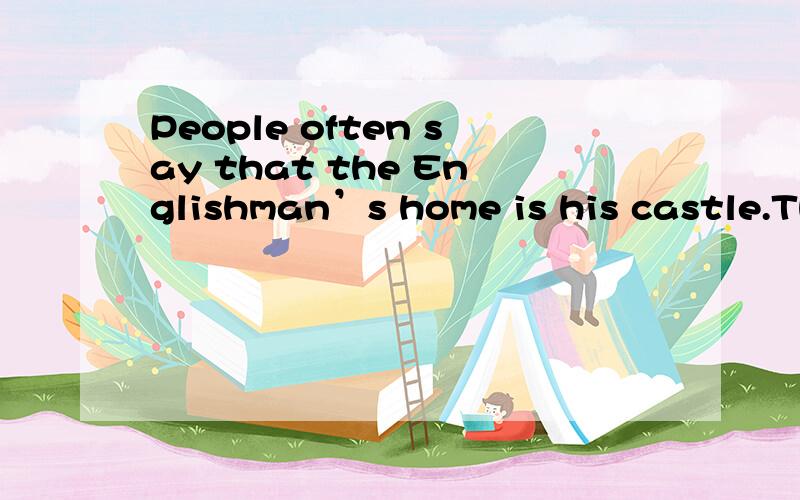People often say that the Englishman’s home is his castle.They mean that the home is very important and personal to him.Most people in Britain live in houses rather than flats,and many people own their homes.This means that they can make them indiv
来源:学生作业帮助网 编辑:作业帮 时间:2024/11/20 04:29:56

People often say that the Englishman’s home is his castle.They mean that the home is very important and personal to him.Most people in Britain live in houses rather than flats,and many people own their homes.This means that they can make them indiv
People often say that the Englishman’s home is his castle.They mean that the home is very important and personal to him.Most people in Britain live in houses rather than flats,and many people own their homes.This means that they can make them individual(个体的);they can paint them,and change them in any way they like.Most house have a garden,even if it is a very small one,and the garden is usually loved.The house and the garden are the private(私人的)space of the individual.
People usually like to mark their space.Are you sitting now in your home or on a train?have you marked the space around yourself as your?If you are on the train you may put your coat or small bag on the seat beside you.If you share a flat you may have one corner or chair which is your own.
Once I was travelling on a train to London.I was in a section for four people and there was a table between us .The man on the space on my side of the table at all.I was angry.Maybe he thought that he owned the whole table.I had read a book about non-verbal communication,so I took various papers out of my bag and put them on his briefcase!When I did this he stiffened and his eyes nearly popped(瞪出)out of his head.I had invaded(侵犯)his space!A few minutes later I took my papers off his case in order to read them.He immediately moved his case to his side of the table.Of course,it is possible that he just wanted to be helpful to me!
If you are visiting another country you may feel that you don’t have any private space.Hotel rooms look much the same in every country in the world.All day long ,you share public spaces with o ther pople.You see the local people in their private spaces and you feel lonely and “outside”.Local people can create their private spaces by talking about things you don’t know about .And you even feel that they like you to be outside them so that they will enjoy being inside even more!This is one of the difficulties of being a traveler!But if you understand it then it helps you .Haven’t you enjoyed being part of a group and “owning”a bit of space?
People often say that the Englishman’s home is his castle.They mean that the home is very important and personal to him.Most people in Britain live in houses rather than flats,and many people own their homes.This means that they can make them indiv
人们常说英国人的家就是他的城堡.他们说家是非常重要,对他个人.大多数英国人住在自己的房子而不是公寓,和很多人自己的家园.这意味着他们可以使他们的个人(个体的);他们可以给他们,改变他们他们喜欢的任何方式.大多数房子都有花园,哪怕是很小的,和花园通常是爱.房子和花园是私人(私人的)的个人空间.
人们通常喜欢标记空间.你现在是在自己家里或火车上?你有显着周围的空间是自己的?如果你在火车上你可以把你的外套或包在你旁边的座位上.如果你有一个扁你也有自己的一角或者为自己所用的椅子.
有一次我乘火车到伦敦.我在一段为四人,在我们中间有一张桌子.那人的空间在我身边所有的表.我生气了.也许他认为他拥有整个表.我读过一本关于非语言交流,所以我从包里拿出一些文章并把他们的公文包!当我这样做,他僵住了,他的眼睛都快蹦(瞪出)出来了.我侵犯了他的空间(侵犯)!几分钟后,我拿起我的文章来读.他马上把他的情况,他身边的桌上.当然,这是可能的,他只是想帮助我!
如果你正在国外,你会觉得你没有自己的私人空间.酒店的房间看上去同世界各国.一天,你与其他人共用公共空间.你看到当地人在自己的私人空间,你感到孤独和“外”的当地人民.可以创建自己的私人空间,谈论一些你所不知道的.你甚至会觉得他们像你在他们让他们享受里面更!这是一个困难的旅行者!但如果你了解它,你没有享受过一部分的一个小组和“拥有”一点空间?
以下根据中国人的习惯翻译,而非直译
人们常说英国人的家就是他的城堡。他们的意思是家对个体和整体都是非常重要的(这句话非直译)。大多数英国人住的是自己的房子而不是公寓,而且很多人有自己房子的所有权。这意味着 有点事情要做,不好意思,下次在帮你翻译...
全部展开
以下根据中国人的习惯翻译,而非直译
人们常说英国人的家就是他的城堡。他们的意思是家对个体和整体都是非常重要的(这句话非直译)。大多数英国人住的是自己的房子而不是公寓,而且很多人有自己房子的所有权。这意味着 有点事情要做,不好意思,下次在帮你翻译
收起